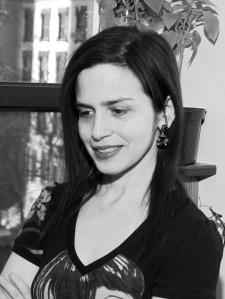I attended my first event at the Asian American Writer’s Workshop in NYC yesterday evening. The event was entitled “Evil Winds and a Bad Moon: Bill Cheng’s “Southern Cross The Dog.” It was a fantastic evening that included vocal artist Imani Uzuri and poet “leadbelly” Tyehimba Jess, truly talented artists that write and sing about “The Blues.” The conversation asked some serious questions about authenticity and belonging.
I won’t get into too many details or hash out the arguments on either side since Bill Cheng and his Southern Gothic novel have both been covered by many different media outlets and interviews. Basically the big question boiled down to: can an Asian American writer write convincingly about a culture he was not raised in? Cheng was inspired to write the book from listening to and being an avid fan of, Blues music. Cheng, interviewed by Scott Cheshire for The Brooklyn Rail, stated that it’s axiomatic that writers are told to ‘write what you know,’ but instead he wanted to write about what he wanted to know. That area of gray, of reaching beyond one’s personal experience can provide a beautiful tension in the make-believe world that is fiction. Taking that risk certainly takes some writing chops. More significantly if the writing is solid and persuasive enough, then it begs the question: does the author really need to have come from that area/ region/ background/ history to come across as authentic? What does it mean to take risks when writing, and can you authentically write about a history or background that you never were part of?
Personally, I believe that if the writing and story are compelling enough then it doesn’t really matter where the author “came” from. On the other hand, having that rich cultural tapestry and background is something that should be respected and acknowledged, if you choose to draw from that experience. It doesn’t make someone who writes from the outskirts any less of an artist or less authentic, even though some such authors have been accused of ‘ventriloquy.’
I think it’s more progressive to want to take these literary risks however. That’s what I look for when I sign writers that write fiction or even memoir. Rainbow Rowell, author of The Attachments and Eleanor & Park specifically addressed the issue of creating characters outside the reach of a writer’s immediate personal experiences. She astutely stated, in an interview with Publisher’s Weekly, “As a writer, I think there needs to be more diversity. Which means that white authors need to write about characters of other races. And that’s really scary. You have good intentions, but at the same time, you’re blind. I probably made mistakes with Park, but I don’t think I’ll regret writing him.” Let’s take that one step further and say that authors, in general, need to write about characters of other races, while acknowledging their fear and the risk they are taking, writers should push themselves without sacrificing their artistic conscience.
Takings risks when writing doesn’t necessarily equate with artistic recklessness, the degree of authenticity and research required seems sharply divided depending on the genre of the book (non-fiction vs. fiction) and also the art form–for some reason readers seem to demand more authenticity from writers of literature whereas the music and film industries give more play and creative license to the creator. I can think of many examples in literature where the writer so inhabits the world he or she writes about that, if the reader didn’t know who the writer was, they wouldn’t be any the wiser. Robert Olen Butler’s short stories in Scent from a Good Mountain come to mind.
That gap between knowledge and imagination, that’s where the beauty, the magic, the alchemy happens…when the writer creates a world that seems so rich and authentic that the persona of who the author is or where he came from is secondary to the story. That’s when you know, as a writer, that the risk was worth taking.





